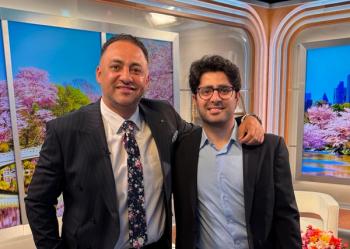
A Day in the Life of a Resident: Yale Psychiatry
From his time working in the outpatient clinic, this psychiatry resident has learned not to underestimate the positive impact psychiatrists can have in the lives of their patients.
[[{"type":"media","view_mode":"media_crop","fid":"15926","attributes":{"alt":"","class":"media-image media-image-right","id":"media_crop_7726486098555","media_crop_h":"0","media_crop_image_style":"-1","media_crop_instance":"866","media_crop_rotate":"0","media_crop_scale_h":"0","media_crop_scale_w":"0","media_crop_w":"0","media_crop_x":"0","media_crop_y":"0","style":"margin: 5px; float: right;","title":" ","typeof":"foaf:Image"}}]]I am a third year resident in adult psychiatry at
As a PGY-2 resident at Yale, I served as a co-president of the Psychiatry Residents Association (PRA), a group made up of all of our psychiatry residents. In this role, I acted as an advocate for my fellow residents and liaison between the residents and administration. I was recently chosen to be one of the 2 program-wide chief residents for our residency in my PGY-4 year and hope to continue to advocate for my fellow residents in this role.
I was originally looking to move to New York for residency after spending most of my life here in Connecticut for college and medical school. Yale was my final residency interview and I thought my rank list was all set with the New York programs. Then I came for my interview here and I loved it, so I had to do some rearranging.
I chose Yale because I felt it was the best balance of everything I was looking for in a residency. I wanted a program with a multitude of training sites to ensure a diversity of patients and patient care experiences. We train at the Connecticut Mental Health Center (CMHC), Yale-New Haven Psychiatric Hospital, the West Haven Veterans Administration, and Yale University Health Services. I also wanted a program that had an association with a psychoanalytic institute to strengthen and balance my psychotherapeutic training (many of our psychodynamic instructors come from the Western New England Psychoanalytic Institute, where residents can take elective courses). Lastly, I was interested in learning more about forensic psychiatry, so I wanted a program with a forensics fellowship, which we have here.
In our third year of training, our work is entirely outpatient with overnight calls taking place every 10 to 12 days in the psychiatric emergency department. For outpatient training, we can request to be placed at either the West Haven VA (which sees veterans with a wide variety of ages, races, and diagnoses); Yale University Health Services (which treats Yale undergraduates with psychotherapy and psychopharmacology); or CMHC (serving the indigent and chronically mentally ill of New Haven).
Because of my interest in treating chronic mental disorders, I chose to work at CMHC, which runs outreach programs for persons at serious risk for mental illness or involved in the criminal justice system. I have my own office and see patients individually for psychotherapy and medication management. I spend 80% of my time working with patients; attending weekly didactics; and meeting with supervisors (we are assigned individual supervisors for psychodynamic therapy, CBT, brief therapy, and medication management). The other 20% of our time is made available for electives, such as research, clinical, or academic courses.
A typical day for me involves getting up at around 6 in the morning to go to the gym before work. I don’t like waking up that early, but I feel good starting my day knowing I have already gotten something accomplished. I arrive at work at around 8:30 AM and spend the rest of my day involved in a variety of activities. A large percentage of my day is spent seeing patients for psychotherapy, medication management, or a combination of the two. I also meet with my supervisors to discuss individual cases. I usually get done between 5 and 6 PM and head home for the day.
What I really enjoy about the third year is autonomy in molding my own schedule. I decide when I see patients, for how long and how often. It really gives me the opportunity to craft a patient’s treatment with them. The other great aspect of creating your own schedule is that you can build in time for additional interests (thanks to the 20% elective time our program guarantees in your schedule). Right now I devote one morning a week either to work on my forensic research project or to gain clinical experience working in the court clinic. There I learn how to do competency to stand trial evaluations. I also have carved out an afternoon a week free from patient care responsibilities so that I can take classes with the forensic psychiatry fellows.
One lesson I have learned from my time working in the outpatient clinic is not to underestimate the positive impact we can have in the lives of our patients. This really came to light for me, as represented in the following vignette. (Certain descriptions and scenarios have been changed to protect patient confidentiality).
Case vignette
A depressed and socially withdrawn female patient I worked with, who inconsistently attended her appointments, called one day after missing her appointment the week before. She said that she felt depressed and was having thoughts of hurting herself, but felt that she could remain safe, and we rescheduled her appointment for the next day. When she again failed to show up and did not respond to numerous phone calls, I became concerned and arranged for a mobile crisis visit to check on her at home.
My first priority was of course to ensure the patient’s safety. I also wondered, assuming she was safe, what we would find and how she would respond to this intervention. Given her propensity to isolate, I worried she would be upset about this intrusion into her private life. Fortunately, when we arrived, she greeted us at the door looking somewhat sleepy and in her pajamas, but otherwise appeared her usual self. She said she was feeling better and no longer had thoughts to harm herself. She apologized for missing our appointment, stating she had overslept, and we agreed to reschedule for the following day.
The next day I waited anxiously to see if she would come and, if so, what she would say about our previous encounters. My thoughts vacillated between expecting her either to be angry or self-conscious about my having seen her in a vulnerable state. She did come to our appointment and, to my surprise, was extremely grateful. She said that having a doctor who cared enough about her to come to her home and check to make sure she was safe, at a time she was feeling particularly sad and alone, had made her feel like she “mattered.” She said that she was no longer feeling so depressed and in our work together we were able to explore further her reaction to this event.
As I reflect on my time working with her, I continue to be struck by how differently we experienced this interaction. To me, the actions I had taken were part of my “job” as her psychiatrist to ensure her safety and an effort to alleviate my own anxiety about her disappearance. To her, this had been evidence that she had value and had a significant positive influence on the way she viewed herself and our relationship. As a trainee, this was an important lesson for me-that our work in the field of psychiatry can often positively affect our patients in ways we may not anticipate or fully understand.
Final thoughts
I have loved my time working and living here in New Haven and wouldn’t trade it for anything. It is a wonderful small city with plenty of restaurants, culture, and exceptional events associated with Yale University.
I would also say that as far as Residency Program Directors go, you can’t do much better than Dr Robert Rohrbaugh. I have been amazed during my time here; particularly while working with him as PRA co-president. He thoughtfully and carefully listens to the thoughts and concerns of residents and makes adjustments to the program based on their feedback. He puts his residents first and that is a wonderful quality to have in the person running your training program. I look forward to continuing to work closely with him in my role as chief resident in the upcoming year.
[Editor's note: If you are a psychiatry resident and would like to submit a Day in the Life article, please forward it to
Disclosures:
Dr Wasser is a resident at Yale Medical School in the department of psychiatry. Thanks to Yale for granting permission to adapt
Newsletter
Receive trusted psychiatric news, expert analysis, and clinical insights — subscribe today to support your practice and your patients.







